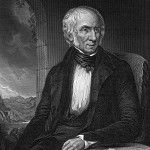A Review of Hamlet by WILLIAM HAZLITT
 It is the one of Shakespeare’s plays that we think of the oftenest, because it sounds most in striking reflections on human life, and because the distresses of Hamlet are transferred, by the turn of his mind, to the general account of humanity. Whatever happens to him, we apply to ourselves, because he applies it to himself as a means of general reasoning. He is a great moralizer; and what makes him worth attending to is that he moralizes on his own feelings and experience. He is not a commonplace pedant. If Lear is distinguished by the greatest depth of passion, Hamlet is the most remarkable for the ingenuity, originality, and unstudied development of character. Shakespeare had more magnanimity than any other poet, and he has shown more of it in this play than in any other. There is no attempt to force an interest: everything is left for time and circumstances to unfold. The attention is excited without effort; the incidents succeed each other as matters of course; the characters think, and speak, and act just as they might do if left entirely to themselves.
It is the one of Shakespeare’s plays that we think of the oftenest, because it sounds most in striking reflections on human life, and because the distresses of Hamlet are transferred, by the turn of his mind, to the general account of humanity. Whatever happens to him, we apply to ourselves, because he applies it to himself as a means of general reasoning. He is a great moralizer; and what makes him worth attending to is that he moralizes on his own feelings and experience. He is not a commonplace pedant. If Lear is distinguished by the greatest depth of passion, Hamlet is the most remarkable for the ingenuity, originality, and unstudied development of character. Shakespeare had more magnanimity than any other poet, and he has shown more of it in this play than in any other. There is no attempt to force an interest: everything is left for time and circumstances to unfold. The attention is excited without effort; the incidents succeed each other as matters of course; the characters think, and speak, and act just as they might do if left entirely to themselves.
There is no set purpose, no straining at a point. The observations are suggested by the passing scene—the gusts of passion come and go like sounds of music borne on the wind. The whole play is an exact transcript of what might be supposed to have taken place at the court of Denmark at the remote period of time fixt upon, before the modern refinements in morals and manners were heard of. It would have been interesting enough to have been admitted as a bystander in such a scene, at such a time, to have heard and witnessed something of what was going on. But here we are more than spectators. We have not only “the outward pageants and the signs of grief,” but “we have that within which passes show.” We read the thoughts of the heart, we catch the passions living as they rise. Other dramatic writers give us very fine versions and paraphrases of nature; but Shakespeare, together with his own comments, gives us the original text, that we may judge for ourselves. This is a very great advantage.
The character of Hamlet stands quite by itself. It is not a character marked by strength of will or even of passion, but by refinement of thought and sentiment. Hamlet is as little of the hero as a man can well be; but he is a young and princely novice, full of high enthusiasm and quick sensibility—the sport of circumstances, questioning with fortune, and refining on his own feelings, and forced from the natural bias of his disposition by the strangeness of his situation. He seems incapable of deliberate action, and is only hurried into extremities on the spur of the occasion, when he has no time to reflect—as in the scene where he kills Polonius; and, again, where he alters the letters which Rosencrantz and Guildenstern are taking with them to England, purporting his death. At other times, when he is most bound to act, he remains puzzled, undecided, and skeptical; dallies with his purposes till the occasion is lost, and finds out some pretense to relapse into indolence and thoughtfulness again. For this reason he refuses to kill the king when he is at his prayers; and, by a refinement in malice, which is in truth only an excuse for his own want of resolution, defers his revenge to a more fatal opportunity….
The moral perfection of this character has been called in question, we think, by those who did not understand it. It is more interesting than according to rules; amiable tho not faultless. The ethical delineations of “that noble and liberal casuist”—as Shakespeare has been well called—do not exhibit the drab-colored Quakerism of morality. His plays are not copied either from “The Whole Duty of Man” or from “The Academy of Compliments!” W e confess we are a little shocked at the want of refinement in those who are shocked at the want of refinement in Hamlet. The neglect of punctilious exactness in his behavior either partakes of the “license of the time,” or else belongs to the very excess of intellectual refinement in the character, which makes the common rules of life, as well as his own purposes, sit loose upon him. He may be said to be amenable only to the tribunal of his own thoughts, and is too much taken up with the airy world of contemplation, to lay as much stress as he ought on the practical consequences of things. His habitual principles of action are unhinged and out of joint with the time. His conduct to Ophelia is quite natural in his circumstances. It is that of assumed severity only. It is the effect of disappointed hope, of bitter regrets, of affection suspended, not obliterated, by the distractions of the scene around him! Amidst the natural and preternatural horrors of his situation, he might be excused in delicacy from carrying on a regular courtship. When “his father’s spirit was in arms,” it was not a time for the son to make love in. He could neither marry Ophelia, nor wound her mind by explaining the cause of his alienation, which he durst hardly trust himself to think of. It would have taken him years to have come to a direct explanation on the point. In the harassed state of his mind, he could not have done much otherwise than he did. His conduct does not contradict what he says when he sees her funeral:
e confess we are a little shocked at the want of refinement in those who are shocked at the want of refinement in Hamlet. The neglect of punctilious exactness in his behavior either partakes of the “license of the time,” or else belongs to the very excess of intellectual refinement in the character, which makes the common rules of life, as well as his own purposes, sit loose upon him. He may be said to be amenable only to the tribunal of his own thoughts, and is too much taken up with the airy world of contemplation, to lay as much stress as he ought on the practical consequences of things. His habitual principles of action are unhinged and out of joint with the time. His conduct to Ophelia is quite natural in his circumstances. It is that of assumed severity only. It is the effect of disappointed hope, of bitter regrets, of affection suspended, not obliterated, by the distractions of the scene around him! Amidst the natural and preternatural horrors of his situation, he might be excused in delicacy from carrying on a regular courtship. When “his father’s spirit was in arms,” it was not a time for the son to make love in. He could neither marry Ophelia, nor wound her mind by explaining the cause of his alienation, which he durst hardly trust himself to think of. It would have taken him years to have come to a direct explanation on the point. In the harassed state of his mind, he could not have done much otherwise than he did. His conduct does not contradict what he says when he sees her funeral:
I loved Ophelia; forty thousand brothers
Could not, with all their quantity of love,
Make up my sum.
- 100 Screenwriting Ideas to Get You Writing - January 20, 2026
- 100 Winter Storm Writing Prompts - January 17, 2026
- 100 Haunted House Story Starters: Craft Your Scariest Tale Yet - January 10, 2026



